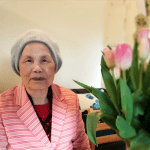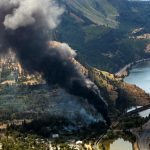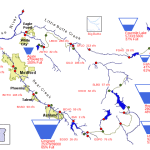
Sometimes There Is No Map
By Susanne Severeid
Copyright 2022
I am watching both of my parents grow very old and, last June, in the case of my father, I watched him die. I know I am luckier than most to have such long-living parents. Dad died at 95 of old age, with his marbles pretty much intact to the end. Mom is now 93 and suffering the health calamities that often come with the territory: her husband is in memory care for dementia, and she has fallen and broken both hips in the past few years. We try to navigate this new landscape as best we can as she deals with other losses as well: decreased mobility, no more driving, moving into assisted living.
I know many Baby Boomers who are caregivers for their aging parents. With more people now living well into their 90’s, there is no denying the impact on younger generations. I only hope that Mom will be able to live out her days with quality. And I know, and am grateful for, what a blessing it is in our daily phone calls to hear her voice end with the words, “Love you.”
I remember a visit with my father not long before he had to leave his home of many years to move in with my brother. It was a nice day and I asked Dad if he wanted to go for a drive. His eyes lit up. Even at 95, Dad could still travel well, so we got in my car.
Where to? I asked. Without answering, he began giving specific directions: turn left here, now right, go left at the next signal. I could tell this was not some random cruise through town; Dad knew exactly where he wanted to go and what he wanted to see.
We drove past his barbershop in the older hacienda-style part of town, we parked for a few minutes in front of the tiny Lutheran church where he’d worshipped for decades, then down a wide, eucalyptus-lined street (“Where the rich people live”). I began to realize that he was saying goodbye: farewell to this modest town in Southern California where he’d spent so many years and which had been a good place for him to live. A small town nestled up against the dry, parched hills that he knew he would never see again once he moved. He directed me to the outskirts, and we drove past a large tree nursery and down a narrow two-lane highway, agricultural fields on either side, straw-hatted workers bent over, toiling in the endless rows of California strawberries and lettuce.
Turn right, he said. I couldn’t see a street where he was indicating, to me it looked more like a small alley. But I did as he said, and it soon opened up onto a wider road. At the T-stop, he indicated a sharp left, and we drove up a slight hill until we reached two heavy, black, wrought-iron gates, standing wide open. Here, he said, Drive in here. And he relaxed and leaned back in his seat.
I drove in slowly. Not because I expected anyone to suddenly dash across the street, but out of an innate instinct to respect the dead and those present who might be mourning, remembering. We passed tidy, freshly-mowed rows, where quietude now had an entirely different meaning. Where the separation between the quick and the dead has become something tangible and finite. This was a small, local, well-tended cemetery with old graves as well as newer ones, with flowers strewn atop the occasional slightly raised, freshly dug, dirt-covered mound.
We parked and I helped Dad out of the car. He could still walk without a cane or walker, though very slowly and keeping me in a perpetual state of anxiety that he might trip or fall. He leaned on my arm every now and then, and I now understood why we were here; he was looking for his late wife’s grave. She had succumbed to cancer several years earlier. We walked past plot after plot, past polished, speckled granite headstones, some ornate, some with ceramic photos of the deceased. I couldn’t help but notice how many were of young people, which struck me as especially sad.
We walked and searched, turned around, walked some more. I asked, “Do you want me to go to the office and get a map so we can find her plot?” “No”, he shook his head, “That’s okay.” I was becoming frustrated; I knew we’d never find it this way. But, unlike me, he didn’t seem bothered; he just wanted to be there, in that place. I walked beside him, letting him move in his own way, at his own pace. Once he thought he’d found her grave under a tree, but when we got closer and studied the markers in the ground, it wasn’t there. By now, I really wanted to find it, I wanted to help him do this. It seemed wrong that we might leave without him being able to see her grave once more. But Dad did not share my anxiety. He seemed comfortable just walking together. And as we walked so very slowly, his hand now resting in the crook of my arm for support, I became aware, suddenly and with a kind of shudder, that the next time Dad would be here would be for his own burial. I knew it, as clearly as if the sun had just passed behind a cloud and I was standing in a shadow.
He stopped to take a break and said, “My ashes are going to go right next to where she is buried.” He smiled. “I think that sounds nice, don’t you?” I nodded dumbly in agreement, not knowing what to say. He seemed comfortable saying it, even content. My brother and I knew Dad had been ready to die for some time and that death held no fear for him. A religious man, he was sure that he would be with his late wife in heaven and I am glad those beliefs gave him comfort.
Some months went by and when Dad died, a small memorial service was planned. I had flown into town and borrowed Mom’s car to drive to the cemetery. After driving for some time, I found myself hopelessly lost. Though her car had GPS, it had never been programmed and sat plugged into the dash warning me in monotones about “possible speed trap ahead” but was otherwise useless. My cell phone had no data out in the middle of nowhere, and I only had about twenty minutes to get there. I had absolutely no idea where I was, no bearings at all. I could picture my brother already standing graveside in a dark somber suit talking in a low voice with the minister wearing his flowing robes, clutching a Bible, other family members and a few local congregants gathered around under the tent canopy. I could feel a mild panic rising in me. How could I miss my own father’s funeral? I am sure a therapist would have a field day with that one.
I pulled over onto the shoulder of a dirt road, turned off the engine and called my partner, David. Thankfully, he picked up right away and patiently talked me through the driving directions, turn by turn, for the next twenty minutes until I finally drove through those heavy metal gates again, just as I had done once before. I made it on time. Just.
There are some places in life that we have no map for but where we still must go, that we still must find somehow. For me, finding the way to my father’s grave was one of them.
Susanne Severeid is an author and actor/presenter with an extensive background in journalism, television and radio, including hosting an EMMY award-winning PBS-TV documentary about Auschwitz and as co-producer/host of “Courageous Grief Talk.” www.susannesevereid.com






